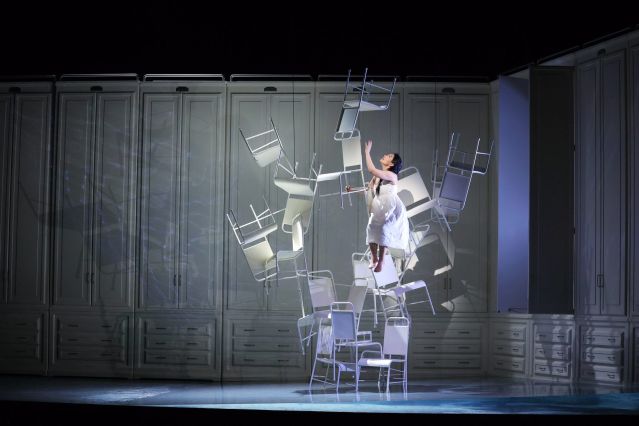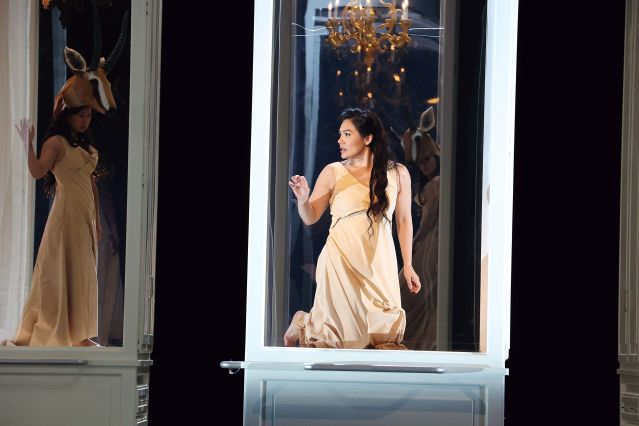Identity
An Opera Explores What to Do When You're Unhappy With Your Identity
The opera "Rusalka" explores the risks and rewards of changing your identity.
Posted July 31, 2023 Reviewed by Abigail Fagan
Antonín Dvorak’s opera Rusalka, first performed in Prague in 1901, has been given a makeover at the Santa Fe Opera this summer, and it goes right to the heart of personal identity, and wanting to change the identity with which you were born. There are hints that it may pertain to sexual identity as well.
The story is based on Hans Christian Andersen’s The Little Mermaid, where the mermaid is willing to leave behind her life in the sea to become human and have an eternal human soul. But in order for this to happen, she has to win the love of a human.

In Rusalka’s life, things are more complex. From her early years, she didn’t want her legs bound together to have the body of a mermaid. She didn’t want to live in the water. She wanted a different body, a human body, with legs that walk and a human soul that lives forever. She idealizes human life and has a tinker toy vision of what it is: there are chairs that she can sit on once she has legs but they are piled on top of each other in helter-skelter fashion like an unstable ladder on which she can escape. She knows little about the prince who doffs his clothes and goes skinny dipping in the water where she lives. They’ve made little kissy faces, maybe more, and this is her idea of love. She confesses her unhappiness and human longing to her father, the water gnome. He is tolerant, he understands the lure of earth, and he’s a lecher in a wheelchair. So, he recommends she ask the sorceress Jezibaba for help.
As a conjurer, Jezibaba can grant her wish, but there is a price. In order to gain a human soul, Rusalka (brilliantly sung by Ailyn Pérez) must make the prince love her. If he ceases to do so, she will be dragged down to the bottom of the lake forever. She’s also given another obstacle: once she becomes human, she will have no voice. It’s hard not to think that this is a comment on some of the abuses and indignities heaped upon women: they should look great, love their man, and shut up. But Rusalka will agree to anything to get a human body. She has one moment of regret that she has left her sea sisters behind, but then she forges ahead with the plan. Jezibaba gives her potions and also performs surgery on her: it looks in some ways like gender affirmation surgery. Her tail is excised, legs are split apart, and she is left with a human form.
Life at the palace is going well until the prince grows tired of Rusalka, who is cold and ethereal, silent and spiritual, and soon he falls for a foreign princess who is hot, passionate, and bears a whip for some pleasure-pain mixture. It is to be noted that the décor of the palace consists of large glass specimen boxes where he keeps the trophy women he has hunted and loved. It’s not too long before Rusalka becomes one of them.

Deprived of speech, bested by a rival, Rusalka is bereft. And now she has nowhere to turn. If she goes back to the water, she will be dragged down to the bottom of the lake to die. And she has no love or support on land. She has forever lost the society she was raised in, and forever excluded from her fantasy life on earth. Jezibaba offers to save her from her doom if she agrees to kill the prince. She refuses. She sacrifices her own salvation for the love of a man who no longer loves her back.
Finally, she returns to the water and what will happen to her? Surprise. The prince misses her terribly. Sex and passion weren’t enough for him. He desperately misses the cooling calm of the spiritual sea spirit. He comes down to the water, and begs Rusalka for a kiss. She knows it will be his doom, but he will do anything for her embrace. He sacrifices his life to die with the sea spirit. At the end of the opera, he lies, dead, face down in the water. And Rusalka disappears into the shadows. Her father calls out that all sacrifice is useless. It’s only one line, but it has enormous resonance and poses a fascinating question.
The opera is about belonging, body and culture dysmorphia, childish idealization, the need to sacrifice one’s self in order to belong, and the need for a balance between passion and spirituality, between body and soul. Women are trophies and specimens to men who are hunters. And then there is that terrifying isolation when you can’t go back to where you came from, and you can’t continue in the place you don’t belong. You’ve given up everything, and for what? Why should you be consigned to silence and being dragged down to the bottom of the sea, divorced from a happy life? The opera doesn’t ask those questions, but the audience (and readers) certainly may.


